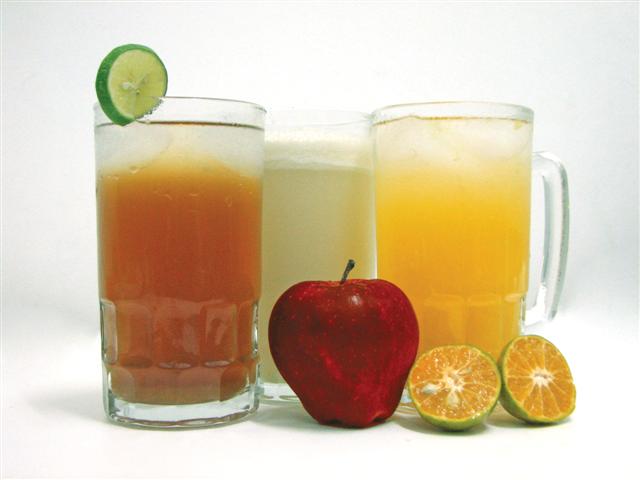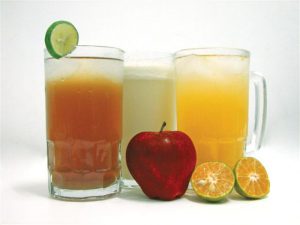
You may think, like the commercial says, that “sugar is sugar” but the fact is there’s a large difference between the sugar in fruit versus what you’ll find in processed snacks and fruit juice. With processed snacks it may be easy to see why they’re not the healthiest choice.
But what about fruit juice? Isn’t fruit juice just a convenient, healthy way to get the same nutrients as whole fruit? Not exactly. Read on to learn more about processed sugar and its effect on your health.
The “Sugar is Sugar” Myth
If you’ve seen the commercial you know what I’m talking about. High fructose corn syrup has been in an uncomfortable limelight lately as new research has proven its link to obesity, diabetes and other health problems. New commercials touting the supposed “safety” of high fructose corn syrup shows a woman in a corn field claiming your body can’t tell the difference between cane sugar and corn sugar. Not so.
The most common type of table sugar is sucrose, a derivative of cane sugar or sugar beets. This substance comes directly from nature and is bound to natural fibers, which ensures the body will process it at a slow, healthy pace.
High fructose corn syrup is made from corn that has been highly processed. Though similar to sucrose and fructose from a compound perspective, this man-made sweetener is not bound to fiber. This means the body processes it much faster, causing a sudden sugar spike. Since corn is a grain, it has a much higher glycemic index, which can lead to chronic raised insulin levels.
When the body is kept in this state, obesity, diabetes, heart disease and even cancer can result.
The next time you’re in the juice aisle, read the label on your favorite fruit juice drink. If high fructose corn syrup is the sweetener, put it back and choose a healthier brand.
Processed sugar such as high fructose corn syrup results in addiction. You can fight America’s sugar addiction by avoiding or cutting back on juices that contains high fructose corn syrup.
Food Dyes and Other Unnecessary Added Chemicals
High fructose corn syrup isn’t the only thing you should watch out for in processed fruit juice. There are other hidden health dangers.
For example, food dye Red #40, which is often found in apple and grapefruit juice, has been linked to hyperactivity, learning difficulties, impulse control and aggressive behavior in children.
Blue #2, found in some blueberry and other dark juices, has also been linked to hyperactivity in children and tumor growth in mice.
Yellow #5, another popular additive in fruit juice has been linked to severe allergic reaction and insomnia.
These food dyes are not only limited to fruit juice. Become a label-reader and investigate the processed snacks you and your family eat. You’ll be amazed at how many dyes and artificial chemicals they contain.
For more on the hidden dangers of food dyes, click here.
The Pasteurization Problem
You may think there’s not much of a difference between a glass of pasteurized orange juice and a glass of OJ squeezed at home. Nothing could be further from the truth. The pasteurization process strips fruit of oxygen to prevent it becoming rancid. It is then stored in vats for up to a year before it ever reaches the dairy section of your favorite grocery store.
The natural flavor-providing chemicals are stripped out, since they would become volatile in such a long storage. When the “juice” is finally ready to be sold, a special flavor packet (natural flavors) is added to make the juice taste fresh-squeezed. This breakfast favorite doesn’t sound so wholesome and appealing anymore, does it?
Why Whole Fruit is Better
When it comes to getting the nutrients you need from fruit, whole fruit is much better for your health. The two most important ingredients in fruit are stripped from fruit juice during processing. These are the skin and the pulp.
The skin of the fruit absorbs the sunlight directly and carotenoids and flavonoids are passed into your system when you eat them. Plus, the skin is rich in essential fiber, an important ingredient in keeping your digestive system healthy and your weight ideal.
You may not know this but the bulk of the vitamin C in a glass of orange juice can be found in the pulp. Processed juice that’s been stripped of the pulp contains far less absorbable nutrients and “pulp added” usually means far less pulp than what the fruit originally contained in its whole form.
There are far more health benefits of whole oranges that you miss out on when you drink a glass of processed OJ.
Juicing for Your Health
Now that you know a little more about bottled fruit juice and some of its health risks, it might be well worth your money and health to invest in a juicer.
Juicing pre-digests the fruit for you. This way, even if you have digestive difficulties, you’ll be able to absorb more nutrients from the fruit. Also, juice is assimilated within 15 minutes of consumption and a little bit goes a long way. You’d have to eat two pounds of fruit each day to get the amount of nutrients you’ll receive in just one 8 ounce glass of pure juice.
When it comes to juicing, it’s best to start slow. The sudden flood of nutrients into your body may cause a healing reaction such as flu-like symptoms or diarrhea. This is perfectly normal as the body begins to heal itself and absorb real nutrition. Fruit juice is best drunk in the morning so your body can use the sugar while you’re active.
For more in-depth information about juicing, click here:
As you can see, there’s a big difference between the nutrients you get from fruit juice and what you can receive from whole fruit. Also, there are often many hidden additives and preservatives in processed snack food that can make you feel horrible. Become a label-reader, trade your processed snacks in for whole fruit and invest in a juicer. Your mind and body will thank you.




I am still amazed at how many people don’t want to eat a fruit such as banana and orange because they are counting calories. Then the same people are drinking juice and soda at a restaurant.
If many people truly understood what is nutritious, we would not be counting calories.
Here is some further proof that commercial orange juice is not as “pure and natural” as it claims to be:
I think you got two contradictory statements made there. In one paragraph, you mention that eating the whole fruit is better because processing takes away the essential nutrients. However, in the paragraph right after that, you advocate juicing. Juicing removes the pulp, fiber and the skin, where all the good nutrients are.
If you ask me, juicing beats the purpose of eating a fruit. Why not just eat it as a whole?
When the industries juice them, they are taking away the oxygen and adding “natural flavors” before distributing them to stores. A juicer may leave the pulp and/or skin inside the cup along with the rest of the fruit juice. The main point is that drinking liquids are far more effective for the digestive system than eating fruits whole.
Chris,
Care to cite any research for your claim that “drinking liquids are far more effective for the digestive system”?
In what way, exactly? There’s certainly less insoluble fibre in juice. There is also (possibly) higher calorie count and (definitely) less “fullness” (due to the reduced fibre/bulk). Unless you’re dying of malnutrition, both are VERY undesirable.
I especially love your swipe at “the industries”. What, so there is absolutely no brand at all that is anywhere similar to what you can do yourself? Really? I can debate that via a walk to the supermarket to find any of the organic whole-fruit smoothies with no “natural flavors” (whatever THAT means) and no added preservatives. There’s a lot of them. Where are you shopping, 7/11?
As for “taking away the oxygen”… not sure what to think about that. Oxygen is generally not something your digestive system cares about (actually, it’ll kill most of your intestinal flora which is anaerobic, so that’s not good right there). Oxygen added to fruit = degraded vitamins and spoilage… so double wrong!
Chris, it is obvious you’ve drunk the health practitioner Kool-Aid. Ironic. Try researching your conclusions rather than jumping to them!